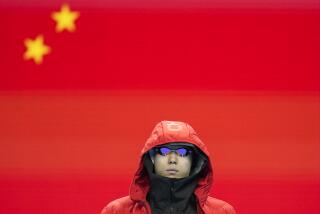IOC Plan for Drug Bans Is Attacked
- Share via
LAUSANNE, Switzerland — After two days of work-group discussion, position papers and relentless spleen-venting from behind the microphone, the International Olympic Committee’s Anti-Doping Summit has produced a consensus on the following points of order:
1. Drugs in sports are bad.
2. Drugs in sports are really bad.
Beyond that, this worldwide conference on doping has been a triumph only in dissent and dissonance, with the IOC’s grand hope of leaving Lausanne with a concrete battle plan for its heralded “war on drugs” vaporizing right in front of its horrified eyes Wednesday.
The IOC’s call for a universal minimum two-year ban for serious first-time doping violations was shouted down by a number of international federations, notably those of soccer, cycling and rowing.
“A terrible mistake” is how Denis Oswald, president of the International Rowing Federation, categorized the proposed two-year ban. “All cases are different, so you cannot have one sanction across the board. You cannot apply the same standard for a 15-year-old athlete who’s under the control and direction of her coach and a 30-year-old athlete who has participated in two Olympics.”
Hein Verbruggen, international cycling’s president, forecast doom for any mandatory suspension longer than one year.
“Longer sanctions will cause a rush of athletes to the civil courts,” Verbruggen said, “with risks of [compensatory damages] that we cannot afford.”
Sepp Blatter, president of FIFA, soccer’s international governing body, said his sport would oppose any fixed sanction on grounds that it would not be enforceable.
“For example, suppose a player is banned for two years,” Blatter said. “Any state court will quash that decision, because of [legal] arguments regarding the player’s ability to make a living coming into play.”
The other major pillar of the IOC’s drug platform--the formation of an international anti-doping agency--was chipped away by disagreement over the composition of the council overseeing the agency, as well as the body’s autonomy and authority.
In fact, the director of the IOC’s medical commission acknowledged that the proposal was so poorly drafted that the summit’s best hope now is to agree on the concept of an agency by today’s conclusion of the meeting.
“There were small errors in the document,” Prince Alexandre de Merode allowed. “It happens.”
Even a fundamental as basic as the definition of doping could not find an accord.
“It’s deficient,” Baaron Pittenger, the U.S. Olympic Committee’s anti-doping director, said of the IOC-proposed definition. “And if adopted, it will lead to significant future problems.”
If not conceding defeat, the IOC acknowledged retreat--albeit amid much happy-faced spin.
“Perhaps we can agree on the principle of an agency,” De Merode offered hopefully, “but at the end of the meeting you will not have an agency decided in detail. It is clear that it needs more study later.”
IOC Vice President Dick Pound characterized the heavy criticism from governmental officials here as indicative of a pleasantly surprising “high level of interest and willingness to become involved with us in designing the agency.”
That process, Pound acknowledged, now will not be completed for “a couple months.”
During a long day of setbacks on the anti-doping front, the IOC also encountered a first roadblock in its efforts to reform its scandal-ridden Olympic site selection procedure by turning over the vote to a specially appointed 15-person committee.
Opposition to that proposal was formally voiced during a closed-door meeting of the IOC’s executive board, with several IOC members arguing that they did not want to relinquish their vote. As one member put it, “If you take the vote away from the IOC, there is no IOC.”
About the only encouraging words to cross the ears of IOC President Juan Antonio Samaranch Wednesday came during a news conference in which the IOC’s athletes commission announced the drafting of an “athletes declaration” stating unanimous support for “President Samaranch and his recent initiatives. Furthermore, we support his work and believe it will lead to the reestablishment of the credibility and trust in the International Olympic Committee and the entire Olympic movement.”
It seemed a surprising stance, in light of growing public sentiment that Samaranch should resign as the IOC seeks a proper course correction.
“I have a lot of criticisms of the IOC,” said athletes commission member Roland Baar, an Olympic rower from Germany, “but if you look at President Samaranch and then you look at the alternatives, if he was not president now, we believe there would be chaos in the IOC. We don’t want to destroy the Olympic movement.”
Added U.S. volleyball player Bob Ctvrtlik: “We need someone very strong, very powerful to get rid of the bad people right now. No one’s saying President Samaranch is perfect, but we need a powerful person in place to do it.”
More to Read
Go beyond the scoreboard
Get the latest on L.A.'s teams in the daily Sports Report newsletter.
You may occasionally receive promotional content from the Los Angeles Times.






